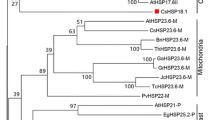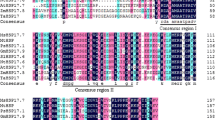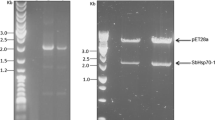Abstract
Small heat shock proteins (Hsps) protect against stress-inducible denaturation of substrates. Our objectives were to clone and examine the mRNA expression of the Hsp16.9 gene from Siberian wild rye grown under diverse stress treatments. We characterized EsHsp16.9 from Elymus sibiricus L. EsHsp16.9 has a 456-bp open reading frame that encodes a 151-amino acid protein with a conserved α-crystallin domain. Northern blot analysis showed that EsHsp16.9 transcripts were enhanced by heat, drought, arsenate, methyl viologen, and H2O2 treatment. In addition, recombinant EsHsp16.9 protein acts as a molecular chaperone to prevent the denaturation of malate dehydrogenase. Growth of cells overexpressing EsHsp16.9 was up to 200 % more rapid in the presence of NaCl, arsenate, and polyethylene glycol than that of cells harboring an empty vector. These data suggest that EsHsp16.9 acts as a molecular chaperone that enhances stress tolerance in living organisms.






Similar content being viewed by others
References
Ahuja I, de Vos RCH, Bones AM, Hall RD (2010) Plant molecular stress responses face climate change. Trends Plant Sci 15:664–674
Basha E, Jones C, Blackwell AE, Cheng G, Waters ER, Samsel KA, Siddique M, Pett V, Wysocki V, Vierling E (2013) An unusual dimeric small heat shock protein provides insight into the mechanism of this class of chaperones. J Mol Biol 425:1683–1696
Hamilton EW, Heckathom SA (2001) Mitochondrial adaptations to NaCl. Complex I is protected by anti-oxidants and small heat shock proteins, whereas complex II is protected by proline and betaine. Plant Physiol 26:1266–1274
Lee KW, Cha JY, Kim KH, Kim YG, Lee BH, Lee SH (2012a) Overexpression of alfalfa mitochondrial HSP23 in prokaryotic and eukaryotic model systems confers enhanced tolerance to salinity and arsenic stress. Biotechnol Lett 34:167–174
Lee KW, Choi GJ, Kim KY, Ji HJ, Park HS, Kim YG, Lee BH, Lee SH (2012b) Transgenic expression of MsHsp23 confers enhanced tolerance to abiotic stresses in tall fescue. Asian-Aust J Anim Sci 25:818–823
Lee KW, Kim KH, Kim YG, Lee BH, Lee SH (2012c) Identification of MsHsp23 gene using annealing control primer system. Acta Physiol Plant 34:807–811
Malik MK, Slovin JP, Hwang CH, Zimmerman JL (1999) Modified expression of a carrot small heat shock protein gene, hsp17.7, results in increased or decreased thermotolerance double danger. Plant J 20:89–99
Mogk A, Deuerling E, Vorderwulbecke S, Vierling E, Bukau B (2003) Small heat shock proteins, ClpB and the DnaK system form a functional triade in reversing protein aggregation. Mol Microbiol 50:585–595
Mu C, Zhang S, Yu G, Chen N, Li X, Liu H (2013) Overexpression of small heat shock protein LimHSP16.45 in Arabidopsis enhances tolerance to abiotic stresses. PLoS One 8:e82264
Sato Y, Yokoya S (2008) Enhanced tolerance to drought stress intransgenic rice plants overexpressing a small heat-shock protein, sHSP17.7. Plant Cell Rep 27:329–334
Siddique M, Gernhard S, von Koskull-Döring P, Vierling E, Scharf KD (2008) The plant sHSP superfamily: five new members in Arabidopsis thaliana with unexpected properties. Cell Stress Chaperones 13:183–197
Varshney RK, Bansal KC, Aggarwal PK, Datta SK, Craufurd PQ (2011) Agricultural biotechnology for crop improvement in a variable climate: hope or hype? Trends Plant Sci 16:363–371
Vierling E (1991) The roles of heat shock proteins in plants. Ann Rev Plant Physiol Plant Mol Biol 42:579–620
Wang W, Vinocur B, Shoseyov O, Altman A (2004) Role of plant heat-shock proteins and molecular chaperones in the abiotic stress response. Trends Plant Sci 9:244–252
Yan JJ, Bai SQ, Ma X, Gan YM, Zhang JB (2007) Genetic diversity of Elymus sibiricus and its breeding in China. Chin Bull Bot 24:226–231
Acknowledgments
This study was carried out with the support of the “Cooperative Research Program for Agriculture Science & Technology Development (Project No. PJ008599042015)” of National Institute of Animal Science, Rural Development Administration, Republic of Korea.
Supporting information
Supplementary Figure 1—Nucleotide and deduced amino acid sequences of small Hsp16.9 (EsHsp16.9) from Siberian wild rye (Elymus sibiricus L).
Supplementary Figure 2—Northern blot analysis of EsHsp16.9 transcripts in response to abiotic stressors.
Author information
Authors and Affiliations
Corresponding author
Additional information
Sang-Hoon Lee and Ki-Won Lee have contributed equally to the work.
Electronic supplementary material
Below is the link to the electronic supplementary material.
Rights and permissions
About this article
Cite this article
Lee, SH., Lee, KW., Lee, DG. et al. Identification and functional characterization of Siberian wild rye (Elymus sibiricus L.) small heat shock protein 16.9 gene (EsHsp16.9) conferring diverse stress tolerance in prokaryotic cells. Biotechnol Lett 37, 881–890 (2015). https://doi.org/10.1007/s10529-014-1749-1
Received:
Accepted:
Published:
Issue Date:
DOI: https://doi.org/10.1007/s10529-014-1749-1




